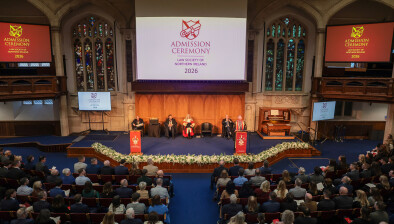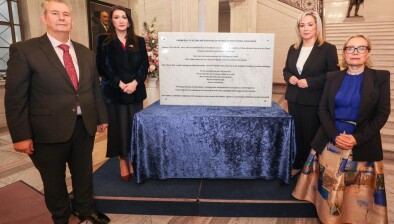NI: Legal safeguards on covert surveillance of Irish detainee insufficient and in violation of article 8, rules Strasbourg

The legal safeguards governing covert surveillance of an Irish man’s consultations with his lawyer were insufficient at the time of his custody the European Court of Human Rights (ECtHR) has ruled.
The applicant in the case of R.E. v. the United Kingdom was arrested and detained in Northern Ireland on three occasions in connection with the murder of a police officer.
He complained about the regime’s covert surveillance of consultations between detainees and their lawyers and between vulnerable detainees and “appropriate adults”.
In today’s Chamber judgment the ECtHR held, unanimously, that there had been: a violation of article 8 – the right to respect for private and family life, home and correspondence – of the European Convention on Human Rights (ECHR) as concerned the covert surveillance of legal consultations; but no violation of article 8 of the Convention as concerned the covert surveillance of consultations between detainees and their “appropriate adults”.
The case was considered from the standpoint of the principles developed by the court in the area of interception of lawyer-client telephone calls, which call for stringent safeguards.
The court found that those principles should be applied to the covert surveillance of lawyer-client consultations in a police station. It noted that guidelines arranging for the secure handling, storage and destruction of material obtained through such covert surveillance have been implemented since 22 June 2010.
However, at the time of Mr. R.E.’s detention in May 2010, those guidelines had not yet been in force. The court was not therefore satisfied that the relevant domestic law provisions in place at the time had provided sufficient safeguards for the protection of Mr R.E.’s consultations with his lawyer obtained by covert surveillance.
As concerned consultations between a vulnerable detainee and an “appropriate adult”, the court found that they were not subject to legal privilege and therefore a detainee would not have the same expectation of privacy as for a legal consultation.
The court, was, however, satisfied that the relevant domestic provisions, insofar as they related to the possible surveillance of consultations between detainees and “appropriate adults”, were accompanied by adequate safeguards against abuse.
The applicant, Mr R.E., was an Irish national born in 1989 and resident in Newtownabbey.
The Regulation of Investigatory Powers Act 2000 (RIPA) and the Covert Surveillance Code of Practice permits, in certain circumstances, the covert surveillance between detainees and their legal advisor, their medical advisor and, in the case of vulnerable detainees, their “appropriate adult”.
Between 15 March 2009 and 8 May 2010 Mr R.E. was arrested and detained on three occasions in connection with the murder of a police officer believed to have been killed by dissident Republicans.
During the first two detentions his solicitor received assurances from the Police Service of Northern Ireland (PSNI) that his consultations with Mr R.E. would not be subject to covert surveillance.
Mr R.E. was arrested for the third time on 4 May 2010. On this occasion, the PSNI refused to give an assurance to Mr R.E.’s solicitor that their consultations would not be subject to covert surveillance. Mr R.E. sought permission to apply for judicial review of this decision.
In particular, he alleged that the grounds upon which the authorisation of such surveillance would be appropriate were not sufficiently clearly defined and that the guidance concerning the securing and destruction of legally privileged information was not sufficiently clear or precise.
On 6 May 2010 he was granted permission to apply for judicial review and the court directed that any subsequent consultations with his solicitor and his medical advisor should not be subject to covert surveillance. Mr R.E. was released without charge on 8 May 2010.
However, Mr R.E’s application for judicial review was dismissed in September 2010. The court held that RIPA and the Covert Surveillance Code of Conduct were clearly defined and sufficiently detailed and precise. The UK Supreme Court refused Mr. R.E.’s application for permission to appeal in April 2011.
Relying in particular on article 8, Mr R.E. complained about the regime – under RIPA and the Covert Surveillance Code of Practice – for covert surveillance of consultations between detainees and their lawyers and between vulnerable detainees and “appropriate adults”.
The application was lodged with the ECtHR on 7 October 2011.
The court reiterated the reasoning in its judgment in the case of Kennedy v. the United Kingdom (no. 26839/05 of 18 May 2010) concerning interception of communications. In that judgment the court held that the domestic law provisions (part I of RIPA) covering the nature of the offences which could give rise to interception, the categories of persons liable to be the subject of interception and the provisions dealing with duration, renewal and cancellation of interception measures had been sufficiently clear.
The government argued that Mr R.E.’s case should be distinguished from Kennedy on the ground that the covert surveillance had been less intrusive than the interception of communications and that therefore the required level of safeguards should be less strict.
However, the court considered the surveillance of a legal consultation constituted an extremely high degree of intrusion into a person’s right to respect for his or her private life and correspondence and consequently the same stringent safeguards should be in place to protect individuals from arbitrary interference with their article 8 rights as in the case of interception of communications, such as a telephone call between a lawyer and a client.
The court noted that, as in Kennedy, the domestic provisions with regard to covert surveillance (Part II of RIPA) had been sufficiently clear in terms of the nature of the offences which could give rise to such measures, the categories of persons liable to be the subject of surveillance and the provisions dealing with duration, renewal and cancellation of surveillance measures.
Furthermore, guidelines to ensure that arrangements were in place for the secure handling, storage and destruction of material obtained through covert surveillance had been implemented by the Northern Ireland Police Service on 22 June 2010.
However, at the time of Mr. R.E.’s detention in May 2010, those guidelines were not yet in force. The court was not therefore satisfied that the relevant domestic law provisions in place at the time provided sufficient safeguards for the protection of material obtained by covert surveillance, notably as concerned the examination, use and storage of the material obtained, the precautions to be taken when communicating the material to other parties, and the circumstances in which recordings could or had to be erased or the material destroyed.
There had therefore been a violation of article 8 insofar as Mr R.E.’s complaint about the covert surveillance of his legal consultations.
As concerned article 8 in connection with the surveillance of “appropriate adult”-detainee consultations, the court held that, unlike legal consultations, they were not subject to legal privilege and therefore a detainee would not have the same expectation of privacy.
The court was satisfied that the relevant domestic provisions, insofar as they related to the possible surveillance of consultations between detainees and “appropriate adults”, were accompanied by “adequate safeguards against abuse”, notably as concerned the authorisation, review and record keeping.
Accordingly, the court held that there had been no violation of Article 8 with regard to this part of Mr R.E.’s complaint.
In accordance with article 41, the court held that the United Kingdom was to pay Mr R.E. €1,500 in respect of non-pecuniary damage and €15,000 in respect of costs and expenses.









